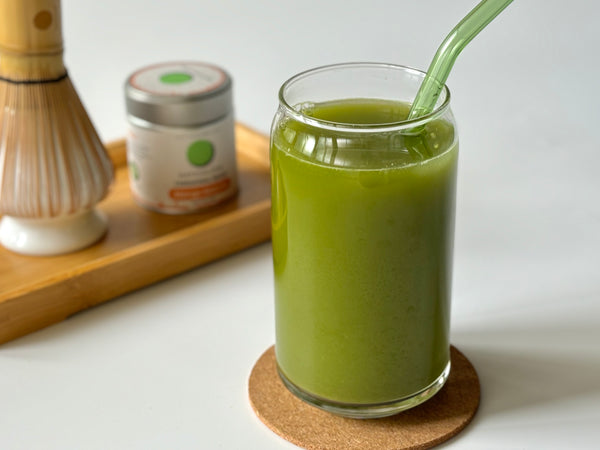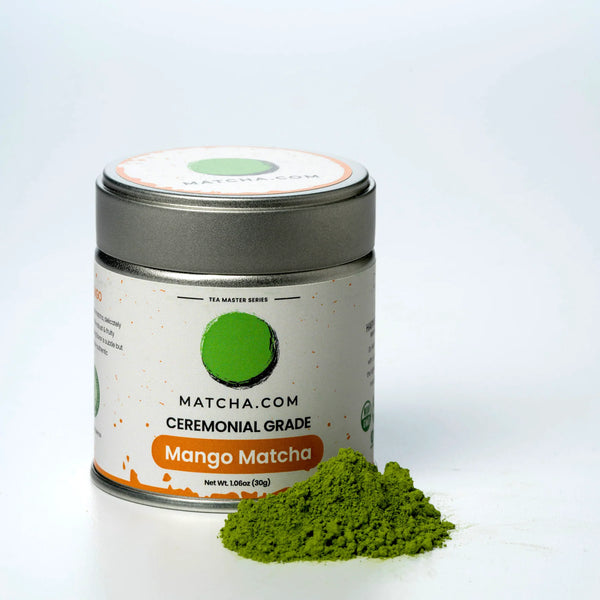Cortisol cocktails have become increasingly popular as a way to support the adrenal system and reduce stress. So naturally, we wanted to create our own matcha cortisol cocktail full of yummy goodness to help you feel energized while also supporting your adrenal system. Overall, this cocktail aims to help you live a lower-stress and happier life. This mocktail hits the spot with coconut water, pineapple juice, and our unique mango matcha blend.

What does a cortisol drink do?
Cortisol is made by the adrenal glands and is known as the “stress hormone.” The adrenals are triangle-shaped organs that sit atop your kidneys. While cortisol can have kind of a bad reputation, it’s actually a necessary hormone. In addition to acting as an alarm system for the body, it also helps to reduce inflammation as well as manages how we use protein, fats, and carbohydrates, regulates blood pressure, increases blood sugar, helps control the sleep/wake cycle, boosts energy in order to manage stress.
In today’s busy world, however, some people’s adrenals are working on overdrive to produce cortisol. This is thought to lead to adrenal burnout and too-high cortisol levels. A cortisol cocktail is meant to help support the adrenal glands through nutrition while restoring appropriate levels of cortisol.
While proper nutrition is absolutely important when it comes to supporting your body’s organ system-- including the adrenal glands, lifestyle habits like yoga, breath work, meditation, and reducing causes of stress likely play a bigger role. That being said, this matcha cortisol cocktail is delicious and a fun way to potentially lower stress. So why not give it a shot?
Why magnesium?
This recipe calls for 200 mg of magnesium citrate, although you can easily leave that out if you’d like. Magnesium is a mineral involved in over 300 enzyme systems in the body. It’s necessary for muscle and nerve function, glucose control, blood pressure regulation, and energy production. Magnesium is also highly associated with stress and may block the pathways that send cortisol to the brain.
Power of Matcha

Matcha is a type of green tea from Japan. It’s unique in the way that it is grown and processed. Matcha is rich in many antioxidants and nutrients, including the amino acid L-theanine. L-theanine has been shown to help reduce cortisol levels and physiological responses to stress. It also helps counteract caffeine so you feel alert and energized without feeling jittery and anxious. If you’re looking to manage stress and anxiety better, matcha makes for a wonderful choice.
Read more about the health benefits of matcha here.
Ingredients:
¾ tsp mango matcha powder
1 cup coconut water
½ cup sparkling water
¼ cup pineapple juice
Juice of ½ a lime
Pinch of Himalayan Sea salt
200 mg magnesium citrate powder
Directions:
1. Sift matcha into a glass. Add the rest of the ingredients and mix well. Serve over ice.

Why we chose these ingredients
Matcha: A clean, jitter-free energy source that won’t cause any extra stress or anxiety.
Coconut water: Coconut water is full of essential nutrients and is a good way to stay hydrated as it naturally contains electrolytes.
Pineapple juice: Pineapple is rich in antioxidants, minerals, and vitamins. It can also benefit the immune system and aid in digestion. Bromalin, which is naturally found in pineapple, can help reduce bloat and improve digestion.
Lime: Adds vitamin C and some freshness.
Himalayan Sea salt: Himalayan Sea salt contains 83 trace minerals and helps the body stay properly hydrated, and may reduce the demand on the adrenals.
Magnesium: Magnesium is an important mineral that many people are deficient in. It is closely tied to stress and anxiety and can help keep us calm and relaxed.
Try out this delicious matcha cortisol cocktail and let it both soothe and invigorate you. Whether you're winding down after a long day or simply seeking a refreshing pick-me-up, let this beverage be your companion in embracing relaxation and rejuvenation. Cheers to a harmonious blend of flavor and wellness in every sip!
Check out these other delicious recipes:
- Matcha Espresso
- Blueberry Lemon Matcha Fizz
- Matcha Latte with Sweet Cream Cold Foam
- Matcha Chia Seed Pudding
Disclaimer: These statements in this blog post have not been evaluated by the Food and Drug Administration. The information provided here is for educational purposes only and should not be considered medical advice. It's essential to consult with a qualified healthcare professional before making any dietary or lifestyle changes.
References:
Cuciureanu MD, Vink R. Magnesium and stress. In: Vink R, Nechifor M, editors. Magnesium in the Central Nervous System [Internet]. Adelaide (AU): University of Adelaide Press; 2011. Available from: https://www.ncbi.nlm.nih.gov/books/NBK507250/
Fayet-Moore F, Wibisono C, Carr P, Duve E, Petocz P, Lancaster G, McMillan J, Marshall S, Blumfield M. An Analysis of the Mineral Composition of Pink Salt Available in Australia. Foods. 2020 Oct 19;9(10):1490. doi: 10.3390/foods9101490. PMID: 33086585; PMCID: PMC7603209.
Schwalfenberg GK, Genuis SJ. The Importance of Magnesium in Clinical Healthcare. Scientifica (Cairo). 2017;2017:4179326. doi: 10.1155/2017/4179326. Epub 2017 Sep 28. PMID: 29093983; PMCID: PMC5637834.
Thau L, Gandhi J, Sharma S. Physiology, Cortisol. [Updated 2023 Aug 28]. In: StatPearls [Internet]. Treasure Island (FL): StatPearls Publishing; 2024 Jan-. Available from: https://www.ncbi.nlm.nih.gov/books/NBK538239/






